Foods For a Healthy Mind: Eating to Nourish Your Brain
As long as we’re alive, we’re growing, so it’s never too late to make positive, healthful changes. The way we eat can impact how we think, how we feel, how well we focus and how well our memory functions.
While you may strive to keep your body healthy through diet and nutrition, what can you eat that’s good for your brain’s health? What foods will keep your mind strong? Of course, everyone is different, and there’s not a magical cure for every set of circumstances. And you should always check with your doctor to see what’s right for you. But here’s an interesting look at some current trends in nutritional advice, based on recent studies and research.
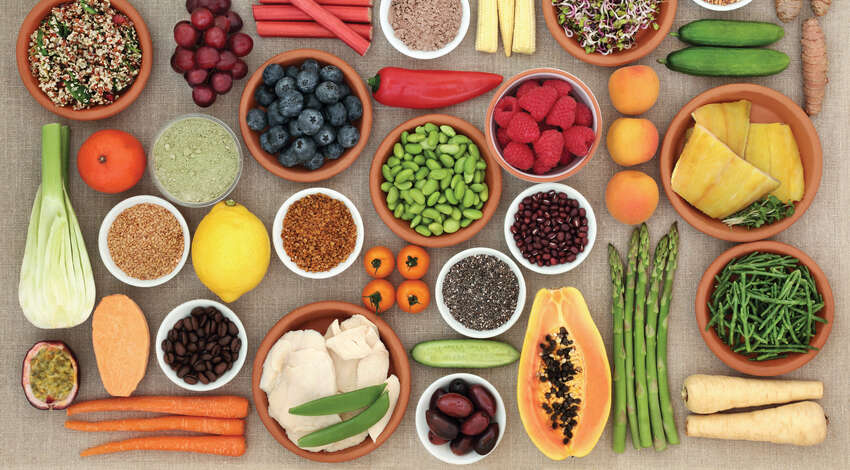
The science of nutrition can teach us a lot when it comes to examining the connection between what we eat and how it can affect our brains. For instance, recently published results in Nature conclude that those who eat a balanced diet show “superior cognitive functions” compared to others. And that those with healthy aging brains have higher concentrations of certain antioxidants, vitamins and fatty acids. The American Heart Association has found that the very same diets that support a healthy heart also support a healthy brain and reduce cognitive decline — diets like the Mediterranean, pescetarian and the Dietary Approaches to Stop Hypertension (DASH).
No particular superfood will make you brilliant the minute you digest it, but many of the recent studies agree that incorporating combinations of nutrients can boost your brain function over time, as well as hone your ability to focus, enrich your memory and lift your mood. And that means aiming to balance your diet through a variety of foods.
Gerontologist and Aging Life Care Manager Alesia Clark in Carlsbad, California, says that when she considers nutrition for brain health, retaining mental clarity and cognitive strength, it’s more about what not to eat. She’s seen an increasing amount of research linking high sugar intake to poor cognitive outcomes, including Alzheimer’s disease. “A brain that becomes insulin resistant is at risk of brain inflammation,” says Alesia, “This interferes with the brain’s ability to work at peak performance.” Whereas, she says, a brain that is not subject to inflammation from a high-sugar diet is able to benefit from nutrition that may improve its health and performance.
There’s a list of brain-healthy foods recommended in Genius Foods by Max Lugavere that Alesia agrees are essential for achieving optimal brain health.
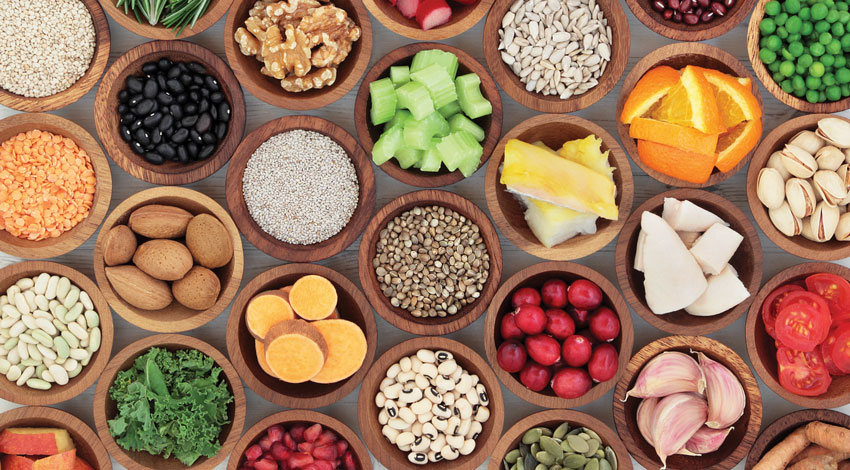
Nutritional recommendations for optimal brain health:
- Extra-virgin olive oil
- Avocados
- Blueberries
- Dark chocolate
- Eggs
- Grass-fed beef
- Dark leafy greens
- Broccoli
- Wild-caught salmon
- Almonds
Meanwhile, over in Encinitas, California, Clinical Nutrition Services Coordinator Erica Dempsey is passionate about coaching adults on how to thrive as they age. Leading numerous presentations on the topic of Nutrition and Brain Health, Erica provides enrichment for her clientele through a monthly group she calls “Nutrition for Cognition.”
Erica is a wealth of information on nutrition and cognitive resilience and offers up several great suggestions.
How to add more brain-healthy foods to your diet:
- Green leafy vegetables: 6+ servings weekly
- Other vegetables: 1+ serving daily
- Nuts: 5+ servings a week
- Berries: 2+ servings a week
- Beans: include in 4+ meals a week
- Whole grains: 3+ servings daily
- Fish: 1+ meal a week
- Poultry: 2+ meals a week
- Olive oil: Make this your primary added fat
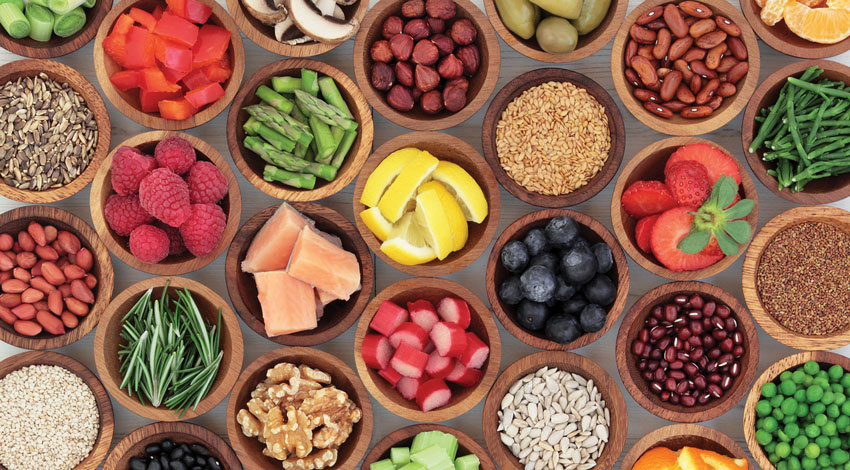
Erica says it’s best to consume less than 25 grams of added sugar per day — which can add up quickly if you’re not paying attention. Fortunately, she offers great ideas for snack time.
Go-to snack options:
- Trail mix that includes fresh or dried mixed berries, nuts and dark chocolate chips. Darker berries are best (think blueberries, açai, raspberries). Nuts like almonds, pistachios and walnuts have the best healthy fats profile.
- Hummus with veggies. Aim for a rainbow of colors, like carrots, bell peppers, jicama and broccoli. And don’t forget — even white is a color.
- Whole-grain crackers with sardines and/or avocado. Look for the word “whole” as the first ingredient on the cracker’s nutrition label and choose sardines that are packed in olive oil.
- Greek yogurt with berries and chopped walnuts. Plain, unsweetened yogurt reduces the amount of total added sugars.
- Popcorn with olive oil and herbs. Air pop the kernels and toss with herbs like rosemary, thyme, paprika and cinnamon for an exciting pop of flavor and flavonoids — those healthy antioxidants.
On the other hand, Erica warns that a diet high in saturated fat, sugar, salt, red meat, processed meat and ultra-processed foods can contribute to an increased risk of dementia.
The good news is that you can modify your lifestyle choices and focus on better eating centered around fruits, vegetables, whole grains, nuts, seeds, low-fat dairy and fish.
Eating better directly affects cognitive health by…
- Activating antioxidants (which reduce disease and cancer risk).
- Preventing inflammation (which can cause arthritis, cancer and mental illness).
- Increasing cell strength (which produces energy).
- Reducing obesity (which reduces risk of dementia).
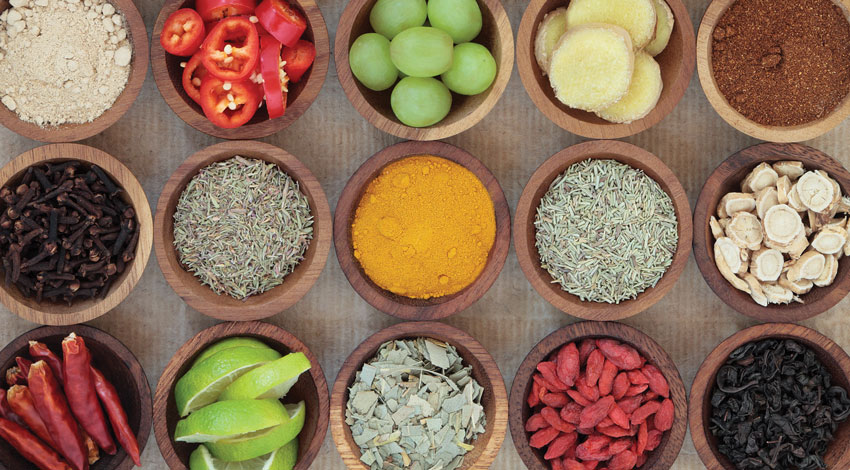
Through their anti-inflammatory and antioxidant properties, specific nutrients protect the brain and limit risk factors associated with dementia.
Specific nutrients that protect the brain against dementia:
- Fermented foods (sauerkraut, yogurt, kombucha, kefir, sourdough)
- Fiber (soluble and insoluble)
- Polyunsaturated fatty acids, or “good fats” (walnuts, flax, salmon, trout, tuna, avocado)
- Polyphenols (berries, cocoa, tea, spices, red wine, beans)
- Phospholipids (dairy, soy, fish, grains)
- Pro/prebiotics and psychobiotics (onions, garlic, whole grains)
Techniques you can easily implement into your healthy eating habits:
- Start your meals with a salad dressed in olive oil
- Fill half your plate with green veggies twice per day
- Reduce added salt to less than 1,500 mg daily
Foods you should limit or reduce in your diet:
- Red meat: less than 4 servings per week
- Butter or margarine: less than 4 tablespoons per day
- Fried foods: 1 serving or less per week
- Pastries and sweets: less than 5 servings a week
Along with the foods you eat, Erica says there are other things you can do that are equally important for your cognitive health, like being social and inquisitive, actively engaging in conversations and regularly exercising.
And while there are many diets, individual nutrients and functional foods out there claiming to reverse or slow cognitive decline, there’s one particular diet that Erica finds to be the most balanced, reasonably easy to follow and inclusive among a variety of age and ethnic groups: the MIND diet.
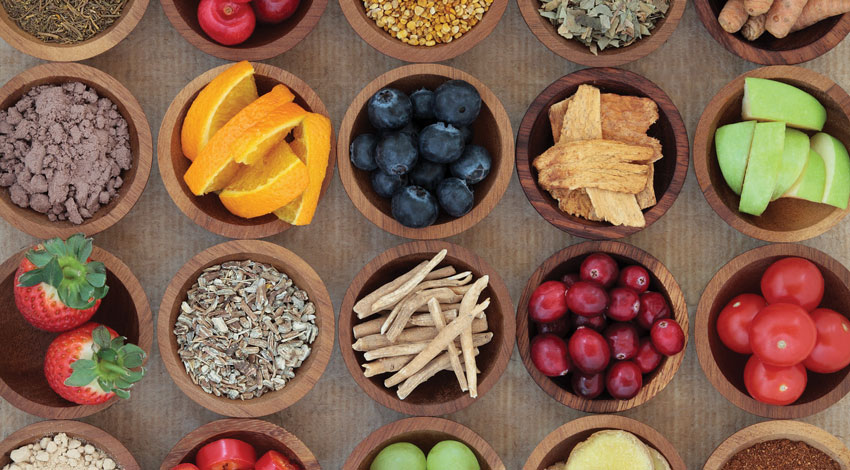
The Mediterranean-DASH Intervention for Neurodegenerative Delay Diet (MIND) is a combination of the Mediterranean and DASH diets. Both have been shown to help prevent cognitive decline, and both are rich in plant-based foods and whole grains. Unlike the two diets separately, the MIND diet combines them, directly impacting brain health by emphasizing foods rich in nutrients known to be neuroprotective (folate, vitamins B6, B12 and D, omega-3 fatty acids) while reducing inflammation and strengthening cells.
The MIND diet influences your health by adding more brain-healthy foods into your diet that are rich in phytonutrients shown to slow the progression of dementia and Alzheimer’s disease.
Ongoing studies so far show that, if followed closely, the MIND diet could lower your risk of developing Alzheimer’s disease by 53% if you stick to eating all those leafy greens.
And so, one bite at a time, meal by meal and snack by snack, here’s to incorporating good foods into your dietary strategy. The sooner you do, the greater the impact could be on your future cognition!
Meanwhile, maybe you’ll want to sign up and learn more through these upcoming online lectures about Science in the Kitchen and New Mexico’s Culinary Traditions.
